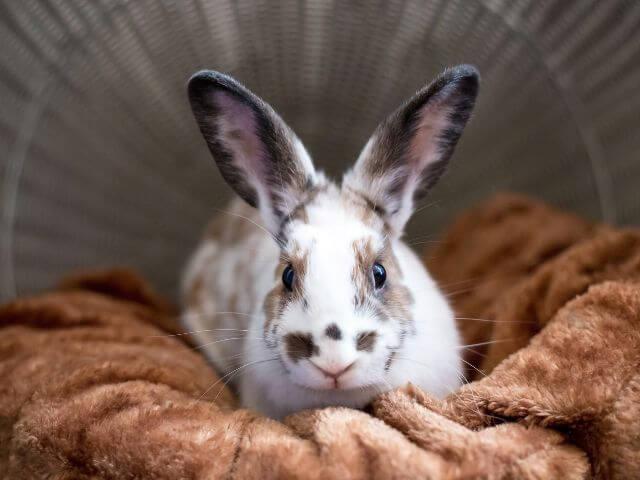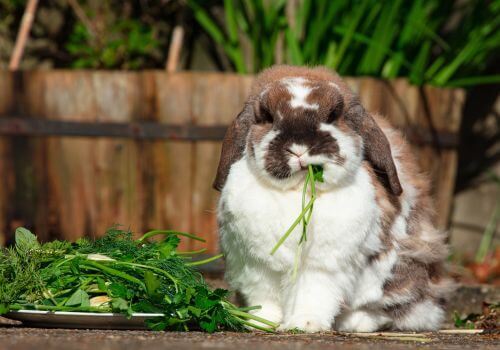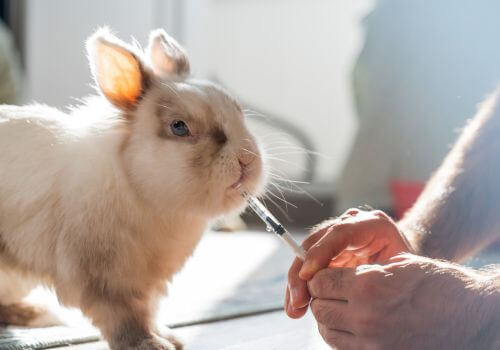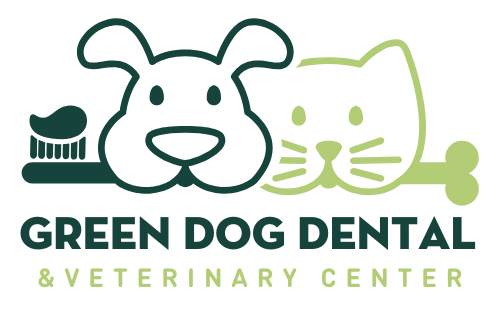
Rabbit Care in Van Nuys, CA
If you are considering owning a rabbit or currently have a pet rabbit, we are proud to offer comprehensive health care for your furry friend at Green Dog Dental - Veterinary Center. We know rabbits can be great pets, but they need specialized veterinary care to keep them hopping and happy. Here at Green Dog Dental Veterinary Center, we want rabbit parents to feel confident about day-to-day husbandry, nutrition, behavior, and when to seek medical care for their pet. If you have questions, our team at Green Dog Dental - Veterinary Center in Van Nuys, CA is here to help! You can call us at (310) 606-2407 and schedule your first visit.
Nutrition: What Do Rabbits Eat?
One of the many questions we get from new rabbit owners is, "What is the best diet for my rabbit?" Rabbits are herbivores and hindgut fermenters, built for a high-fiber diet that keeps the digestive tract and teeth healthy. It's important to know that inappropriate diets are a leading cause of illness, so feeding your rabbit correctly is imperative for their long-term health.

- Unlimited grass hay: Fresh timothy, orchard grass, oat hay, or similar grass hay should be offered to adult rabbits at all times. Alfalfa (legume) hay should be offered to young, growing rabbits with a transition to grass hay at 4-6 months of age. Pregnant or lactating rabbits should be provided both grass hay and alfalfa.
- Dark leafy greens: Provide a daily variety of dark leafy greens and herbs such as romaine, green leaf lettuce, red leaf lettuce, cilantro, basil, bok choy, endive, and carrot tops. Introduce new greens gradually and continuously rotate.
- Quality pellets: Limited amounts of high-quality, uniform timothy hay-based pellets can be given in addition to hay and leafy greens. Pellet mixes or pellets that contain corn, wheat, dried fruits and/or nuts should be avoided. Typical recommendation is 1-2 tablespoons/day.
- Treats & fruit: Offer rabbit-safe treats sparingly. Timothy hay-based treats are available. It is recommended that larger treats be split into multiple servings. Avoid high-sugar treats and gas-producing veggies.
- What rabbits should not eat: Avoid iceberg lettuce, onions, garlic, chocolate, seeds/nuts, bread/crackers, and any processed human foods.
Still have questions about your rabbit's diet? Ask your doctor at your visit!
Husbandry & Environment for Your Rabbit
Your rabbit's housing and surroundings are important aspects of their health and well-being. This is where they will spend much of their time, so ensuring that it is a safe and sanitary space is essential.
- Living space: Rabbits need as much space as possible. Great options would be a rabbit-proofed room or an area sectioned off with an exercise pen. As a minimum, the enclosure should be at least 3–4 times your rabbit’s adult stretched length. Solid, well-padded flooring is recommended to reduce the chances of developing pododermatitis ("sore hock"). Rabbits should never be housed on wire bottom of slatted caging.
- Free-roam time: Plan several supervised hours daily for exploration, exercise, and social time. Bunny-proof areas by covering cords, blocking baseboards, and removing toxic plants. Rabbits can also benefit from supervised outdoor time! Please ensure any outdoor area is free from any pesticides or chemical treatments. Supervised outdoor time provides environmental stimulation (enrichment) and allows exposure to the sun - UVB light is important for rabbits to have healthy bones!
- Litter area: Many rabbits can be litter box trained! In some cases, spaying and/or neutering can help with maintaining healthy litter box habits. Use a paper-based, unscented litter (never clumping clay or pine/cedar shavings). Place hay in or directly next to the litter box, many rabbits graze while they go.
- Companionship: Rabbits may be kept as pairs. It is important that they are spayed and/or neutered to prevent unwanted pregnancy, aggression, and/or fighting. Bonding takes patience and gradual introductions. It is recommended that bonding is performed in a neutral space.
Rabbit Veterinary Care & Wellness
Do bunnies need to go to the vet? Yes. It's a common misconception that rabbits don't need to see a doctor. The truth is that rabbits benefit from an annual wellness exam (twice yearly for seniors). Your rabbit's health can change quickly, and because they mask illness, early detection can be life-saving.

- Find the right veterinarian: Look for an exotic companion mammal veterinarian (often listed simply as “exotics”) who routinely treats rabbits.
- Spay/neuter: Spaying dramatically reduces the risk of uterine cancer in females; neutering reduces hormone-driven behaviors in males and can support smoother bonding.
- Parasites: Rabbits are susceptible to parasites. Never apply dog/cat products without veterinary guidance, as many are harmful/toxic to rabbits.
- Vaccination: Ask about Rabbit Hemorrhagic Disease Virus type 2 (RHDV2) prevention in your area and whether vaccination is appropriate for your pet.
- Preventive care: Regular examinations and following veterinary recommendations can help your bunny live a happy, healthy life!
New to rabbit care or adopting soon? Schedule a baseline exam so we can set you up for success! Call our team at Green Dog Dental - Veterinary Center at (310) 606-2407.
A Rabbit's Activity & Enrichment Needs
Rabbits are curious, clever, and active. They can get bored easily, and this often drives digging and chewing in unwanted places. Mental Stimulation and activity can help curb these habits and keep your rabbit content.
Build in daily enrichment for your rabbit by:
- Movement: Provide safe tunnels, ramps, and platforms for climbing and hopping.
- Foraging: Hide hay in boxes, paper bags, or puzzle feeders. Rotate toys to keep interest high.
- Training: Many rabbits enjoy clicker training and can learn simple cues. Short, positive sessions are best.
- Chewing outlets: Offer safe chew items (untreated willow, apple sticks, cardboard) to support behavioral needs.
- It is also important that all rabbits have supervised time in a large area for exercise for 4-6 hours per day. You can also allow them a larger space full-time (an extra room), but is important that the area is bunny proof.
Our team can help you choose appropriate enrichment based on your rabbit's specific needs.
Rabbit Hygiene and Dental Care
All rabbits shed (often in cycles). Long-haired breeds may need daily brushing; short coats generally need at least weekly brushing, with more frequent sessions during heavy molts. Brushing reduces hair ingestion, which can lead to GI obstructions.
- Nail trims: Usually every 4–6 weeks. A cat-style trimmer works well; trim small amounts to avoid the quick.
- Rabbits' teeth continuously grow, but they don't need regular teeth trims unless medically necessary. Their teeth alignment and high-fiber diet will allow them to wear down naturally.
A Few Rabbit Facts
We get asked often if rabbits are good pets for kids. Rabbits can be wonderful family pets, and do well with individuals and full families. Many bunnies prefer to keep four feet on the ground and be petted rather than carried. However, for safety, grooming, and medical purposes, it is important that you work with your rabbit to ensure you are able to pick them up and place them in a carrier when necessary.
- Normal behaviors: Thumping (to signal alarm), binkies (joyful leaps), chinning (scent marking), and digging/chewing are normal behavior.
- Handling & body language: Support the hindquarters when lifting; watch for signs of stress like struggling, tooth grinding (pain), or hiding.
- Multi-pet homes: Calm, supervised introductions to other household pets is essential. Avoid predatory or high-prey-drive situations.
How Do I Know If My Bunny Is Sick?
Rabbits often hide illness until it’s advanced, so identifying subtle changes can be really important.
If you notice any of these signs, make an appointment for your bunny to be seen:
- Lethargy, hiding, or a marked change in behavior
- Eating less or not at all, fewer or misshapen stools, diarrhea
- Tooth grinding (pain), drooling, wet chin, facial swelling
- Sneezing, nasal/eye discharge, head tilt, ear scratching
- Straining to urinate, urine scald, incontinence
- Hair loss, itching, scabs, or other changes to the skin
GI stasis is an emergency. If your rabbit stops eating or producing stool, it is recommended you seek veterinary care immediately.
Veterinary Care for Rabbits at Green Dog Dental - Veterinary Center
At Green Dog Dental - Veterinary Center, we are here to support you through your pet parent journey. Whether you’re setting up your first habitat, planning a healthy diet, navigating bonding, or noticing potential health concerns, our veterinary team is a trusted resource for rabbit care in Van Nuys, CA. We offer wellness exams, healthcare guidance and recommendations, and urgent care for time-sensitive issues.
If you live in or near Van Nuys, CA, and are looking for pet care, contact us at (310) 606-2407 to make an appointment. You can also email us at [email protected].
Don't forget to follow us on social media: Facebook, Instagram.
